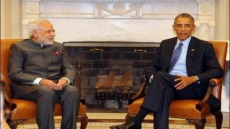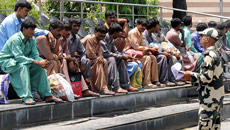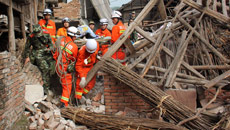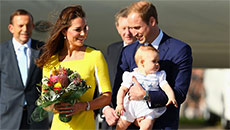A British Indian MP has strongly criticised the BBC for a programme on India's new Prime Minister Narendra Modi that she stated was not objective.
In a letter to BBC Director General Lord Tony Hall dated May 19, Priti Patel, British prime minister David Cameron's Indian diaspora champion, brought to notice the complaints she received about BBC Newsnight aired May 16, which covered the day the results of India's general elections were announced.
"Many in the British Indian community, particularly those of Gujarati origin, were offended by the reporting about prime minister-elect Narendra Modi," Patel, the MP from Britain's Witham constituency in Essex, stated.
She pointed out that the programme's presenter, Yalda Hakim, referred to Modi as a "controversial figure" from the beginning of the programme.
"Modi's political opponents have portrayed him as being 'controversial', so by using this reference, the BBC, who should be impartial, is giving acceptance to the political position of Modi's opponents rather than reporting objectively," Patel stated.
"The term 'controversial' could be used to describe a large number of politicians, which is why many people in Britain's Indian community believe its use purely in relation to Modi in the news item was unbalanced."
She also pointed out to to the fact that Hakim stated in the programme that Modi had "blood on his hands" and he was "India's most divisive politician".

"Modi secured the largest democratic mandate in world history in a peaceful and professional manner, with his party winning a majority of votes throughout India and able form a government. This was a point that was not conveyed by the presenter," Patel, a Conservative Party MP, wrote.
She also referred to the fact that the programme focussed on Modi's so-called involvement in the 2002 Gujarat riots without going into the details thereafter.
Patel was particularly irked by the fact that the programme featured a British Indian artist named Anish Kapoor who was critical of Modi.
"The decision to interview Kapoor and portray him as an expert on Indian politics is bizarre," she stated.
"Kapoor has spent the last 40 years living in the UK and is an artist. He has no record as an expert on politics or commentator on Indian affairs. Moreover, the presenter did not offer sufficient or adequate challenge to the assumptions he made about the elections and comments he made about Modi."
Patel also drew the BBC director general's attention to the introductory part of the programme which had Kapoor stating that "India's dreamed itself a dream with a mass murderer as its main character".
"Although the presenter asked him what he meant by mass murderer, she did not challenge him to provide evidence to support his claim. Claiming someone who is a democratically elected politician is a 'mass murderer' is an extremely serious allegation and unless such a claim is substantiated with meaningful evidence, the BBC should not be broadcasting this slur."

Patel also took exception to the fact that Kapoor referred to the Indian general elections as "supposedly democratic".
"Given that there have been no serious allegations of malpractice and that the elections involved about 550 million people casting their vote, it is concerning to see that the presenter did not challenge Kapoor on this claim," she said in the letter.
Born in London, Patel studied economics at Keele University and did her postgraduation at the University of Essex. She also chairs the All Party Parliamentary Small Shops Group and is an active member of the Free Enterprise Group.





